Margarito Morales
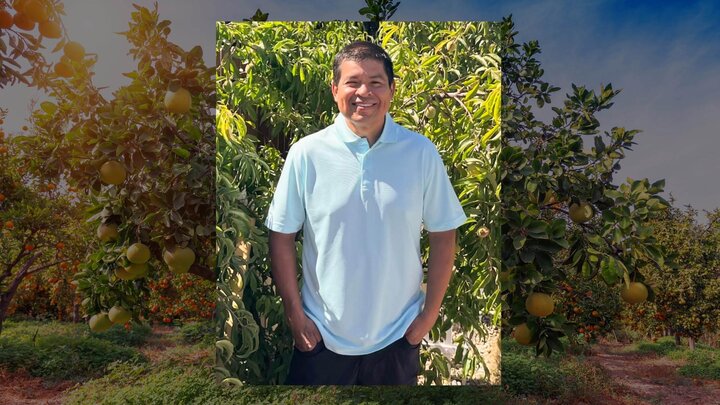
Morales graduated with a master's degree from the Department of Agronomy and Horticulture online program in May 2023.
July 14, 2023
Hometown
I grew up in Soledad, California and moved to Fresno to complete my bachelor’s degree, which is where I now reside.
What degree did you receive from Nebraska?
I earned a Master of Science in agronomy with a minor in entomology May 2023.
Where did you receive previous degrees and what were they in?
I am a graduate of Fresno City College where I received an Associate of Science degree. I earned a Bachelor of Science in plant science – plant health option from California State University, Fresno.
Why did you decide to study at Nebraska?
After reviewing several agronomic graduate study programs, I chose the University of Nebraska–Lincoln based on it’s challenging curriculum and the university's outstanding reputation in the agricultural community.
Who influenced you to do your graduate work here?
I always wanted to earn a master’s degree, so this school was a good fit for me. I also met with the faculty and staff before I began my studies at UNL and they were very encouraging. Lastly, my family was very supportive of my decision, as well as my advisor Dr. Dave Goorahoo from Fresno State.
What are your favorite things about the department and your program of study?
I really benefited from being challenged by my advisors Dr. Don Lee and Dr. Meghan Sindelar and the rest of the faculty. The staff was so helpful when I had questions. My colleagues were also amazing. I gained a lot of invaluable knowledge that I apply to my daily work and home life. Overall, it was a challenging but rewarding program.
Describe your research.
I am a California and Arizona licensed pest control advisor who specializes in post-harvest decay control of fruits and vegetables. My research work consisted of testing chemical treatments for post-harvest lemon preservation. Lemons were treated with several post-harvest chemicals to determine which treatment provided superior decay and weight loss control. I also conducted research on Integrated pest management of cutworm in agronomic crops. The research consisted of the different methods used to reduce cutworm damage in agronomic crops.
What are your plans post-graduation?
I will continue my work as an agricultural pest control advisor.
Margarito Morales is at mmorales7@huskers.unl.edu.
Sheryl Sierra
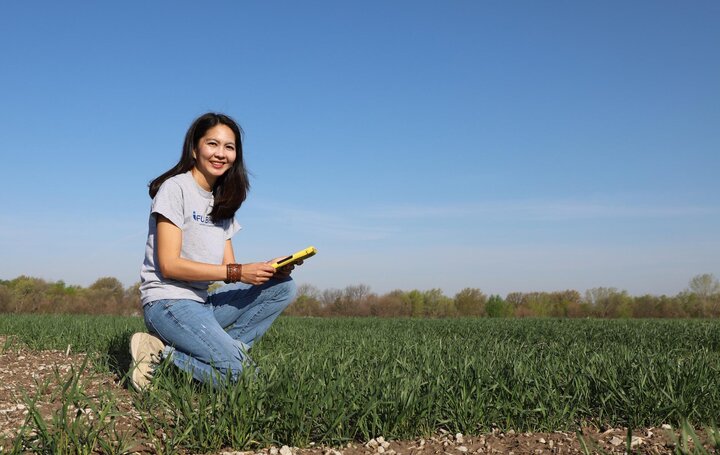
Sierra is a Department of Agronomy and Horticulture doctoral student studying plant breeding and genetics and is advised by agronomy professor Katherine Frels.
May 1, 2023
Hometown
I am from Indang in the province of Cavite, Philippines.
Anticipated degree
I am pursuing a Ph.D. in agronomy in plant breeding and genetics with an anticipated graduation date of May 2024.
Where did you receive previous degrees and what were they in?
I am a graduate of the University of the Philippines Los Baños, Laguna, where I received a Bachelor’s of Science degree in biology majoring in genetics. While studying for my undergraduate degree, I participated in a summer internship at the Asian Vegetable Research and Development Center (AVRDC) in Taiwan and worked on the inheritance of whitefly-transmitted geminiviruses in tomatoes. I received my master’s degree in crop sciences and biotechnology at Seoul National University, South Korea, where I majored in crop molecular breeding. While studying there, I worked on genetic diversity analyses of rice landraces collected in Cordillera, Phillipines.
Why did you decide to study at Nebraska?
My interest in plant breeding and genetics led me to pursue a Ph.D. at UNL. The Fulbright Foreign Student Program Scholarship for 2020-2022 gave me an opportunity to study in the United States. Nebraska is an ideal choice for agriculture, and since UNL has a strong agricultural program, I pursued this program because I wanted to contribute to developing better varieties of wheat and barley that I believe will improve the quality of life for the world’s increasing population. Dr. P. Stephen Baenziger has been especially valuable helping me learn the practical side of being a breeder when I first joined UNL, which is inspiring for not just me but also other future breeders.
What are your favorite things about the department and your program of study?
The professors and administrative staff are very supportive in helping students succeed with our programs — professional development and social events, networking opportunities and of course free perks through challenging times. Because the people are so supportive, it becomes easier to face the difficulties of being a student abroad. Dr. Katherine Frels has been especially helpful and very supportive as an advisor to help me be a better plant breeder. Our research group, UNL Small Grains Breeding, is also an important support system for me. Overall, I love the culture and varied community of the agronomy department at UNL. For me, there is no place more delightful than our department!
Describe your research.
Our research is to develop methods to improve breeding and selection for wheat quality and end-use traits in the UNL breeding program. This research is making use of past quality and genomic data from the breeding program to develop genome wide association studies and genomic selection models for improving dough, mixing and loaf traits of bread. We are trying to better understand the key genes related to quality traits in our wheat germplasm and figure out how we can improve combinations of these genes to develop high quality wheat cultivars for producers in Nebraska.
What are your plans post-graduation?
When I’m done with my program, I will do a return service to my home country for two years, serve my home university of Cavite State University, and apply the knowledge I gained at UNL to teach and hopefully help to strengthen the plant breeding research program there in the Philippines. I am open to pursuing a plant breeding career in the industry in the future.
Sheryl Sierra is at ssierra2@unl.edu.
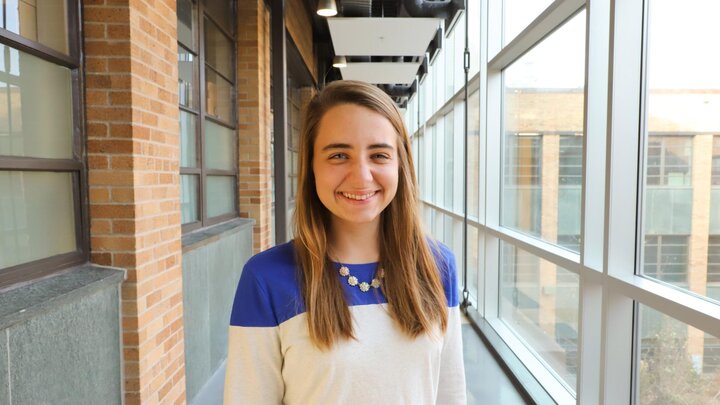
Hall is a Department of Agronomy and Horticulture doctoral student studying integrated crop and livestock systems and is advised by agronomy professor Daren Redfearn.
January 24, 2023
Hometown
I am from Peru, Indiana, a small town in the north central part of the state.
Anticipated degree
I am pursuing a Ph.D. in agronomy with an anticipated graduation date of May 2025.
Where did you receive previous degrees and what were they in?
I attended Purdue University (Boiler Up!), where I got my Bachelor of Science degree in Agronomy. Then I came to the University of Nebraska–Lincoln and received my Master of Science degree in Agronomy in 2021!
Why did you decide to study at Nebraska?
During my undergraduate degree I was given the opportunity to complete an internship here at UNL, doing a summer research program in the agronomy department. That summer I learned what the process of research looked like from project development, through data collection, to presenting results. I also learned about grad school and the opportunities that come with those degrees, so I decided that I wanted to pursue a master's degree after I graduated. I stayed in touch with the professor that I worked with at UNL as I finished up my undergraduate degree, which led to an opportunity to come back and work with them for graduate school! The connections that I made and work that I accomplished during my master's degree then led to me being able to stay at UNL and pursue my doctorate degree, working with the same professor!
What are your favorite things about the department and your program of study?
I originally chose to come to Nebraska because of the research opportunities that were available. The agronomy department in particular is focused on sustainability, resiliency and forward thinking, all while putting the farmers, ranchers and producers first. Extension-based research, with goals of answering questions that producers bring in, so that decisions can be made to improve their systems is what I am passionate about. So, finding a department like this that shares that passion is exciting!
In addition to the research opportunities here, I love the culture and community of the agronomy department at UNL. Professors, staff and students all work together to accomplish their goals, answer questions and solve problems. I also love all of the opportunities to be involved in the department as a graduate student through organizations like the AHGSA, serving on committees and teaching opportunities!
Describe your research.
My research is about integrated crop and livestock systems, looking to see what the effects are of adding grazing livestock into our cropping systems. We are using two cropping rotations: a corn-soybean rotation and a corn-soybean-wheat-cover crop rotation. The corn residue and cover crops are grazed over winter, and then plant and soil data is collected to compare the systems. The hope is that the more diversified systems, with the addition of livestock will be more sustainable and economically competitive than traditional cropping systems.
What are your plans post-graduation?
After graduation I hope to get a job where I can educate producers on research that is being done, help answer the questions they have, and work with them to find solutions to improve their systems.
Alyssa Hall is at akuhn2@huskers.unl.edu.
Balpreet Kaur Dhatt
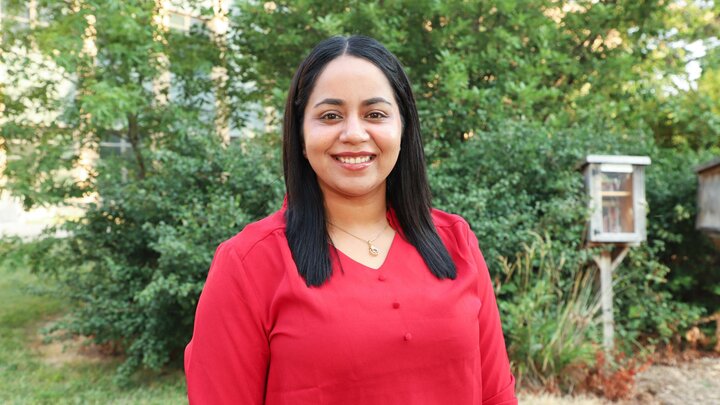
Dhatt was a Department of Agronomy and Horticulture doctoral student studying plant breeding and genetics and was advised by agronomy professor Harkamal Walia.
Hometown
My hometown is Ludhiana, in Punjab state of India.
Anticipated degree
I am pursuing a Ph.D. in agronomy with a plant breeding and genetics specialization. I will be graduating in December 2022.
Where did you receive previous degrees and what were they in?
I received a B.Sc Agriculture (hons.) from Punjab Agricultural University in 2016. Plant breeding, genetics and biotechnology were my majors.
Why did you decide to study at Nebraska?
As a key agricultural state, Nebraska has always influenced me. I was more attracted to the research being conducted by Dr. Walia on abiotic stress tolerance in cereals, which made me choose Department of Agronomy and Horticulture at UNL. Apart from my graduate advisory committee, I was guided by a former post-doctoral scientist in our lab, Dr. Puneet Paul. He always motivated and influenced me to develop a collaborative nature and scientific perspective in my research projects.
What are your favorite things about the department and your program of study?
Diversity and cheerfulness are my favorite things in the department. After spending nearly six years here, I feel at home with my fellow graduate students and departmental staff. The fun thing about my program of study is the curiosity to dig deeper into the molecular mechanisms underlying visible phenotypic traits in crop plants.
Describe your research.
My research projects aim to develop strategies that could make our crop plants tolerate rising temperatures due to global warming. Our lab group is doing so by identifying certain genes that might be very useful for breeding heat-stress resilient crops.
What are your plans post-graduation?
I want to utilize my molecular biology and plant physiology research experience to pursue a career in the agricultural industry. I believe that doing so would help me achieve my ultimate goal of contributing to the plant science community by working towards solving major agricultural challenges that we WILL face soon!
Balpreet Kaur Dhatt is at dhattbalpreet03@gmail.com.
Mandeep Singh
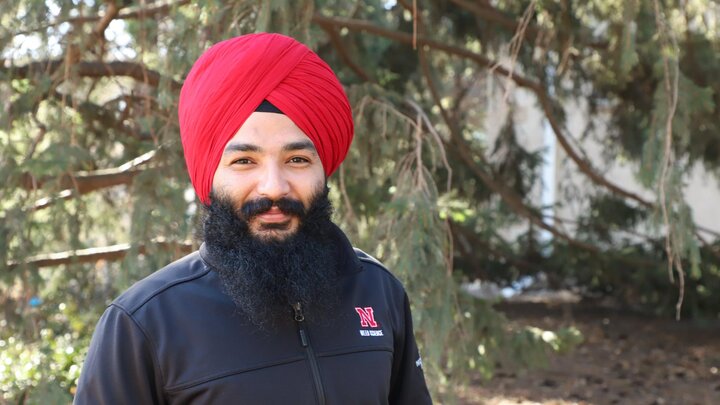
Singh is a Department of Agronomy and Horticulture doctoral student studying weed science and is advised by agronomy professor Amit Jhala.
Hometown
I’m from Panjab, India.
Anticipated degree
Ph.D. in Agronomy & Horticulture with weed science specialization. I am anticipating to graduate December 2023.
Where did you receive previous degrees and what were they in?
I received my bachelor's degree in agriculture (Major: Agronomy, Soil Science & Forestry), and master's degree in agronomy (Minor: Botany) from Punjab Agricultural University, Ludhiana, Panjab, India.
Why did you decide to study at Nebraska?
In Agronomy, weed science was always my primary interest. During my master's degree program, state-wide multiple herbicide resistance of little seed canarygrass in wheat was a huge problem in Panjab. This sparked my interest in managing herbicide-resistant weeds. Nebraska is a leading state in agriculture production in the United States, just like Punjab in India. This inspired me to join the University of Nebraska-Lincoln. Weed scientists at Punjab Agricultural University made me aware of Dr. Jhala's program, which was successfully helping growers to manage herbicide-resistant weeds. I contacted Dr. Jhala and was fortunate enough to get an opportunity to work with him. Jhala is a leader in agronomy and serves thousands of growers in Nebraska for effectively managing their crops.
What are your favorite things about the department and your program of study?
My favorite things about the department are the friendly and welcoming environment, great interactions with great researchers and the opportunity to solve practical world problems of growers. Weeds are tough, always evolving and managing them is a continuous challenge. And I enjoy this challenge.
Describe your research.
I am evaluating herbicide interactions to better manage herbicide-resistant volunteer corn in corn. When corn is harvested, some corn kernels are left behind on the ground. These kernels overwinter and germinate next year as volunteer corn. Volunteer corn takes up moisture and nutrients causing corn (main crop) yield losses. Therefore, it is important to manage it. Also, volunteer corn, depending upon herbicide-resistant traits in the previous year corn, can be resistant to herbicides such as glyphosate and glufosinate. This eliminates glyphosate and glufosinate as post-emergence herbicide options to control volunteer corn in corn. Hence, growing EnlistTM corn (corn resistant to FOP herbicides) and applying Assure II (quizalofop) is one option to control glyphosate/glufosinate resistant volunteer corn in EnlistTM corn. However, growers prefer to tank-mix herbicides to save money, time, and labor. But mixing broadleaf herbicides such as 2,4-D with grass herbicides such as Assure II often reduces grass control. Therefore, I am trying to understand whether mixing Assure II with 2,4-D will reduce volunteer corn control or not, because broadleaf herbicides such as 2,4-D often have an antagonistic effect on grass control of grass herbicides such as Assure II (ACCase inhibitor; quizalofop).
What are your plans post-graduation?
Most probably, I will continue my career in academia.
Mandeep Singh is at msingh9@huskers.unl.edu.
Ramandeep Kaur
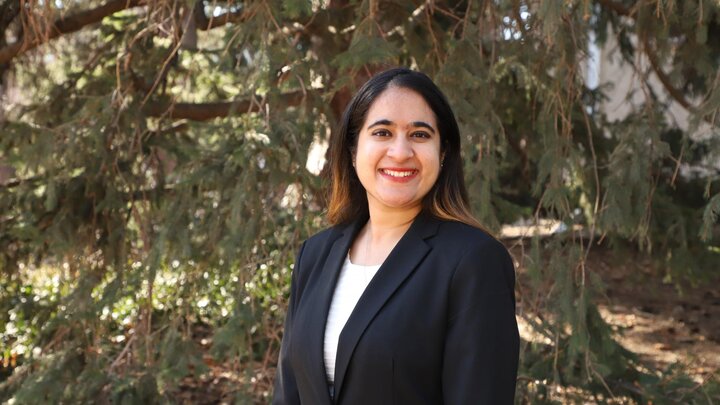
Kaur graduated from the Department of Agronomy and Horticulture and studied weed science and was advised by agronomy professor Amit Jhala.
Hometown
I’m from a very small village called Gorsian Khan Mohammad near Ludhiana city in Punjab state, India.
Anticipated degree
I completed a Bachelor of Science in Agriculture with Honours and a Master of Science in agronomy with a specialization in weed science from Punjab Agricultural University, Ludhiana. I am currently pursuing a doctorate in agronomy and horticulture with specialization in weed science and am anticipating graduating January 2024.
Why did you decide to study at Nebraska?
I was keenly interested in doing research in weed science. After completion of my master’s, I decided to focus on weed science and began to look for opportunities abroad in an effort to broaden my knowledge base. In January 2018, I initiated a Ph.D. at the Punjab Agricultural University in resource conservation technologies. However, my interest was always inclined towards the weed science sector. I contacted Amit Jhala to study for my Ph.D. in weed science. The University of Nebraska–Lincoln has a reputation as being at the forefront of weed science curriculum and research. Dr. Jhala guided me in applying for the Netaji Subhas ICAR international fellowship. I applied, interviewed and was fortunately selected for the international fellowship.
What are your favorite things about the department and your program of study?
The foremost is the varied and friendly environment of the department. My favorite thing is our Jhala team, interaction with Dr. Amit, and the activities in the department. I have interacted with many faculty members in this department, and I am very pleased to say that each of them has guided me in the right direction. The positive and helping environment motivates me to work hard.
Describe your research.
My research work is on the management of Atrazine, Glyphosate, and ALS-inhibiting Herbicide-resistant Palmer amaranth in herbicide-resistant and food grade corn. A survey by Weed Science Society of America has listed Palmer amaranth as the number one troublesome weed in the United States. Six broadleaf weeds in Nebraska have been confirmed resistant to glyphosate including common waterhemp, common ragweed, giant ragweed, marestail, kochia, and most recently Palmer amaranth. A survey reported that about 6 million acres in Nebraska are infested with at least one glyphosate-resistant weed. Confirmation and widespread occurrence of atrazine, glyphosate, and ALS-inhibitor-resistant Palmer amaranth in Nebraska is a concern for corn producers. Nebraska is one of the largest corn producing states in the United States with the production of corn on about 9 to 10 million acres annually. Optimum corn yield depends on number of factors including effective weed management. Research experiments were conducted near Carleton, Thayer County, with the objective to develop an integrated approach for the control of multiple herbicide-resistant Palmer amaranth in herbicide-resistant and food grade corn. I participate in the Extension Field Day which is organized to demonstrate the results of our projects to corn growers and will be presented in the number of upcoming Extension meetings and conferences.
What are your plans post-graduation?
I would like to do a post-doc in weed science. I am also interested in working with weed science industries.
Jaspinder Singh
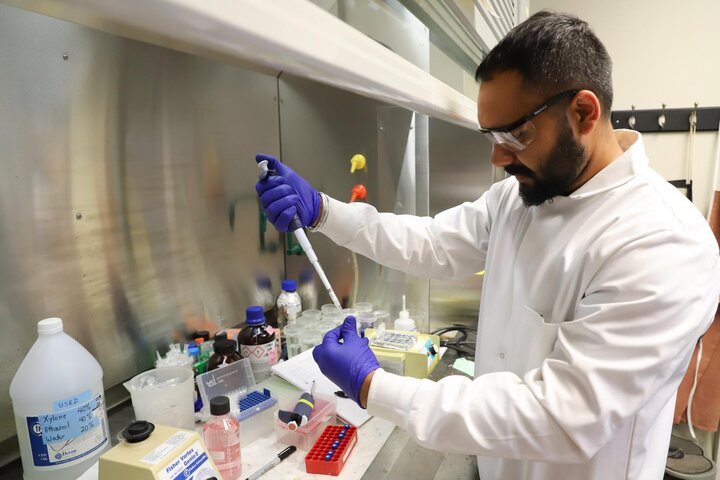
Singh prepares samples to quantify the endogenous levels of a phytohormone, auxin. Auxins are known as key regulators of plant growth and development and orchestrate cell division, cell elongation and differentiation, root and stem tropisms, and more.
Hometown
I grew up in a small village named Jawandha in the Fatehgarh Sahib district of state Punjab, India. Punjab is a state in northern India, and it is pronounced as ‘Panj-aab’ where the literal meaning is the Land of Five Rivers. Punjab was the front-runner during the time of green-revolution, thereby, also known as ‘Food-Bowl’ of India.
Anticipated degree
I completed a Master’s degree in agronomy from Nebraska in 2018, and am currently pursuing a doctorate in plant breeding and genetics. I am anticipating to graduate December 2022.
Why did you decide to study at Nebraska?
The credit goes to the cascade of events that happened during my childhood. The untimely demise of my father rendered me and my younger brother with no other option than to continue the inherited occupation ‘agriculture’ as a source of income along with the continuance of education. As a result, we developed an obvious and natural relationship with crop plants. This was the time when I thought about pursuing a career in plant science. After the completion of high school, I joined one of the internationally acknowledged institutes of agricultural science in India, Punjab Agricultural University. From PAU, I finished a degree in B.Sc. Biotechnology. In the final year of my undergraduate, I started looking for opportunities overseas to further broaden the sphere of my knowledge. I learned that Nebraska’s Institute of Agriculture and Natural Resources placed Nebraska at the leading edge in the field of plant sciences. State-of-the-art facilities available here are a rare and great opportunity for prospective students. I started contacting faculty members whose research work matched my interest. Fortunately, I established correspondence with Paul Staswick, who has done an enormous work related to phytohormones, especially jasmonic acid. Staswick accepted my application and provided me the opportunity to work with him.
What are your favorite things about the department and your program of study?
I like many things about the Department of Agronomy & Horticulture, however, the foremost is the varied and friendly environment. When an international student flies thousands of miles away from his/her hometown, it is always his/her expectation to land in a safe and sound environment. I am proud to say that our department is doing a great job in this context. So far, this department has given me numerous opportunities to serve in various roles such as vice-president of AHGSA (2017-2018), GSA representative of AHGSA (2021-2022), committee member of Nebraska Plant Breeding Symposium, graduate student committee member for an annual conference organized by National Association of Plant Breeders, and graduate student representative in the course curriculum committee, etc. While serving in these positions, I have interacted with many faculty members in this department, and I am very glad to mention that from time to time every one of them has guided me in the right direction. Experienced gained from this department is also helping me to serve in a couple of national-level associations as well.
Describe your research.
My main research work is to find the mode of action and underlying molecular mechanisms behind the activity of a tertiary amine plant growth regulator, BMVE. BMVE is a compound patented by a regional seed company of Nebraska, Kamterter. Kamterter claims that the seed treatment with BMVE before sowing out in the field results in vigorous growth and development. However, it is not known how this compound imparts its effect and works at the molecular level. My job is to investigate its biological activity so that Kamterter can use this knowledge and incorporate BMVE treatment into seed priming techniques for commercial purposes.
What are your plans post-graduation?
Since I am working on a project that has direct or indirect significance at the industrial level, I am more inclined towards pursuing a career in crop science-based industries.